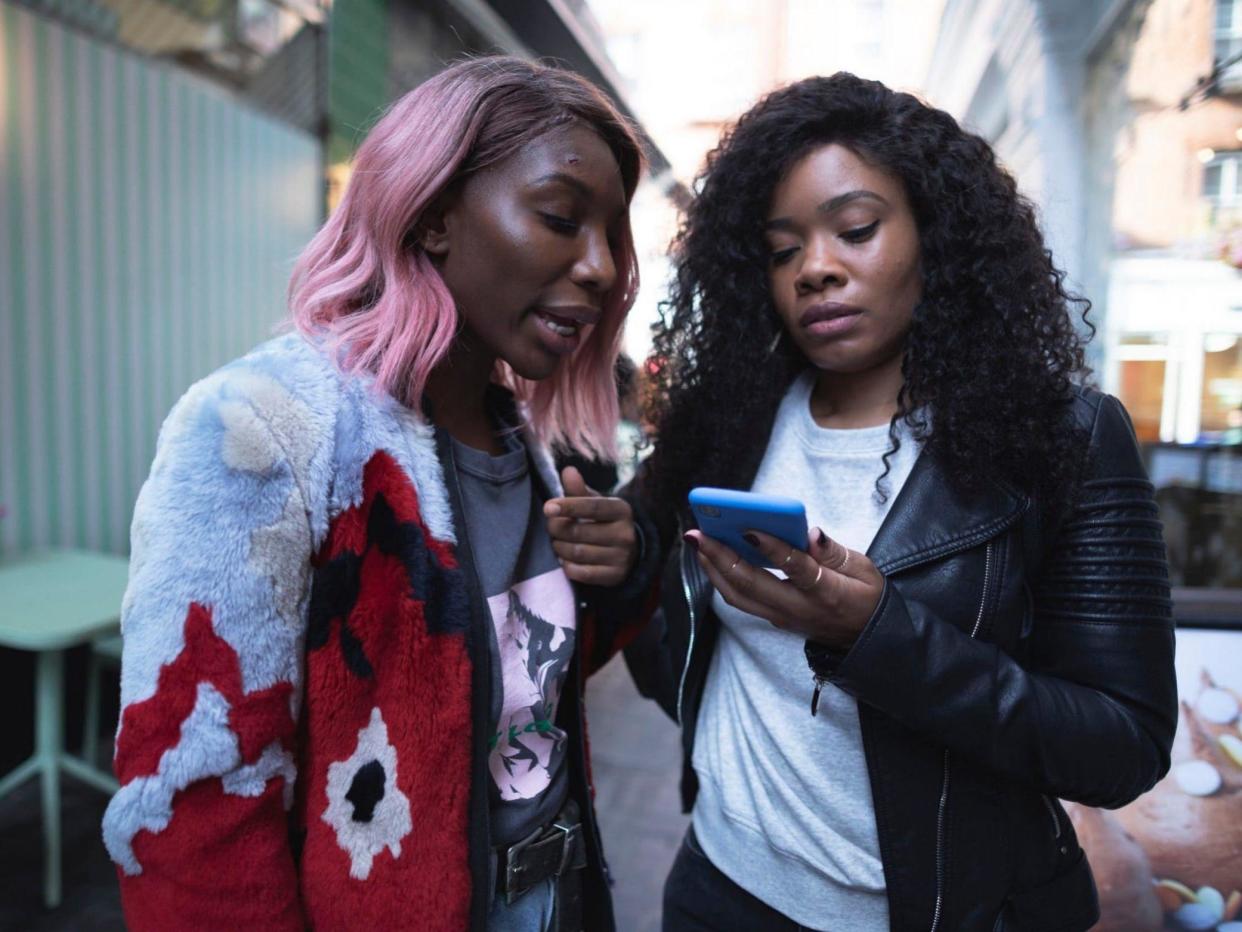I May Destroy You shows how seamlessly phones take hold of our existence

In I May Destroy You – Michaela Coel’s powerful comedy-drama based on her real-life sexual assault – Arabella’s face is almost always lit up by the white beam of an iPhone. When it’s not in her hands, it’s in her bomber jacket pocket vibrating against her ribs. Even with the deadline for the first draft of her book looming, Arabella’s FaceTiming her friend Simon. “You can’t be airing my calls,” he tells her. “I get anxiety.” She smiles back, so big that the steep incline of her cheekbones becomes even more severe. Arabella’s friend Kwame yells, “Hang up,” but he too is on his phone, swiping left and right on Grindr until he gets a match. Arabella wants to put her phone down, turn it off, concentrate. But as soon as she does, she picks it back up again. White light glints at the top of her cupid’s bow.
Phones are so ubiquitous nowadays that people are paying to get them surgically implanted beneath their skin. And yet screens – not just phone screens, but all of them – are almost entirely absent from all of our new TV shows and films. I laughed out loud the other day at a shot of a medical clinic waiting room in Tamara Jenkins’s Private Life, because only one of the 15 patients was on their phone. Characters rarely take selfies, answer emails, or use Citymapper. If they watch a film, it is always some old black and white Charlie Chaplin film, rather than, say, Queer Eye on Netflix. In bed, they don’t watch dog rescue videos, they actually sleep. When phones do appear in dramas, their role is minor and rarely does it encapsulate the way that they are actually used in real life. Either characters make quick phone calls – which most people nowadays have developed a phobia of – from which they hang up abruptly without saying bye, or it’s a comic exaggeration: a moody teenager slobbering over their phone, unable to pull their eyes away from it even for one second.
This isn’t just a stylistic choice – the lack of technology in most of our cultural products shows how society has lost its ability to confront and interrogate the logic of contemporary existence. By making phones invisible, films and TV shows are unable to comment on the role they play in our lives. With its characters constantly DMing and Skype-calling, I May Destroy You is an anomaly, exploring how our devices have transformed us, for better or sometimes for worse, into cyborgs.
Granted, phones are difficult to film. Our interactions with such devices are usually dull. I don’t want to watch people googling “how to fix a stiff spacebar” or compulsively refreshing to see how many likes their new Made.com sofa is getting on Instagram. No wonder, then, that Greta Gerwig’s decision to set her 2017 film Lady Bird in 2002 was based on her notion that “to make a movie about teenagers now, you have to shoot cell phones …Their [lives] happen online and I don’t think it’s very cinematic.” A lot of time spent on phones is a waste of time, which doesn’t make for a particularly pacey plot. Dealing with screen time tracker’s hard truths is difficult enough, without the additional stress of having the too-relatable issue of social media addiction writ large on iPlayer.
Dramas set in the contemporary erase phones, and the rest of the TV and film landscape avoids dealing with them entirely by focusing on worlds where they haven’t even been invented yet. “New” releases are mostly revivals, gender swaps, or period pieces. From Friends to Fresh Prince, practically every successful Nineties TV show has been scheduled for a remake. Six out of eight of the nominees for best film at the 2019 Academy Awards were period pieces – of the other two, Black Panther revives a comic book hero from the 1960s and A Star is Born is a remake.
Our heavy reliance on images of the past marks a withdrawal from the challenge of innovation. According to Fredric Jameson in his book The Cultural Logic of Late Capitalism, our willingness to rip off images of the past, or pastiche them, is symptomatic of a retreat from the challenge of modernism. Starting in the late 19th century, the modernist movement rejected tradition and called for artistic experimentation in order to adequately depict contemporary life. Modernism believed that revolutionary art forms – say, the multiple perspectives of Cubist paintings or the composer Arnold Schoenberg discovering a wholly new way of organising sound based on the use of 12-note rows – could mobilise social change by giving audiences a different way to see. Our current condition, postmodernism, suggests that everything has been done before. So instead of new stories, we get a more realistic cartoon Simba or an all-woman spin-off of the Ocean’s trilogy.

When directors choose modernity over capitalising on nostalgia, we get dramas which confront us with how much of our lives are spent posturing for a lurid red like. It helps that the generation who came of age just as this kind of technology did are now making art – not just baby boomers who find it all deeply suspect and confusing. In Sky’s skateboarding drama Betty, when a woman accuses Janay’s friend of sexual assault, Janay tracks her location down to a scruffy bar in Brooklyn via stalking her Instagram stories. Another time, friends of skater girl Camille rename the guy she likes on her phone contacts “small dick” so she remembers not to text him.
One episode of Broad City’s season five is told entirely through Instagram stories. With shots of a crying Oprah gif pasted over a brunch spread and a musical zoom-in on a dog spotted on the subway, the episode perfectly encapsulates the humour that exists online. High Maintenance’s “Selfie” sees aspiring journalist Anja scrolling social media the moment she wakes up. She then showers and styles herself before jumping back into bed for an “I woke up like this” selfie under the caption: “Work harder. Spend more time alone.” The rest of Anja’s day is spent photographing the mundane movements of her day, or at least those that the algorithm favours.
Irresistibly modern, I May Destroy You confronts us with the way phones frame and control our existence. After she is raped, Arabella is able to piece back together the fragments of her night through Uber receipts and Google Maps. A podcast playing through Spotify into Arabella’s ears leads her to realise the gravity of her love interest Zain’s decision to remove a condom without her consent. Another phone films Zain when she takes to the stage to out him as an abuser at a well-publicised writer’s event. “He is a rapist,” she announces over flickering camera flashes. “Not rape-adjacent, or a bit rapey – he’s a rapist.” When her speech goes viral, Arabella becomes a sort of #MeToo influencer, who alongside providing support for those who have been assaulted, becomes the face of Happy Animals, a sort of vegan Amazon service.

As in real life, Arabella’s phone is neither unambiguously good nor bad. Her viral tweets were collated into the best-selling Rupi Kaur-style Chronicles of a Fed-Up Millennial, which in turn has led to a book contract at an illustrious publishing house that probably would have ignored her otherwise. But her phone gives with one hand, and takes away with the other. Instead of writing, Arabella endlessly refreshes Messenger just in case her on-off Italian drug kingpin boyfriend Biagio has texted in the seconds since she last refreshed. Phones enable the outing of abusers where police prosecution often fails, but they also enable abuse in the first place. It was a phone which helped Arabella to end Zain’s career, but it was also a phone that, back in 2004 when Arabella was still at school, enabled her friend Marcus to take pictures of himself having sex with another student without her consent. The phone’s moral status is upended yet again when the images help prove him innocent of her allegations that he raped her at knifepoint. Everything in I May Destroy You is slippery and unclear. Phones aren’t necessarily good or bad. The people holding them in their hands aren’t either.
Seeing I May Destroy You, and these other TV shows, explore characters’ relationships to their phones has made me think about the pitfalls of my own obsessive compulsions. Last summer, I was walking down my road in Seven Sisters, chatting to my Mum on the phone, when a kid on a bike snatched it out of my hand and sped away into the mesh of concrete back streets. “He just stole my phone,” I said to a man walking past, as though he could do anything. I felt like a limb had been amputated. As though an extension of my arm had disappeared with the bike into the bleak pinkish-grey night. I was devastated. But the problem wasn’t that people wouldn’t be able to get hold of me. I’m on enough social media sites to be accessible anywhere, at any time. The phone was insured and there weren’t any photos or information on there that I couldn’t recover elsewhere. Instead, losing the phone hurt because I felt like some of my life force had disappeared. That it was beating like a heart behind the screen that had been taken away.
Sometimes, my attachment to my phone is even more consuming. The other day, I dreamt I was inside my Twitter feed, tumbling down amid the two-dimensional scatter of words. In the shower, I often imagine sassy snapbacks to imaginary Twitter arguments. Other times, I like what my phone does to me. It makes me feel safer. I think Twitter has made me a more concise writer, and one that is better tapped into the language of now.
I rarely think about my phone – other than how I should stop scrolling and stand up – but recently I have been, because Michaela Coel made me. Arabella tweets beyond deadlines she vowed never to miss. She mishears friends because she’s busy texting another friend who’s not in the room. My phone might destroy me. Coel made me aware enough to feel it happening. I probably won’t do anything about it.
Read more
How a new wave of dramas about rape is redefining victimhood

 Yahoo News
Yahoo News 
